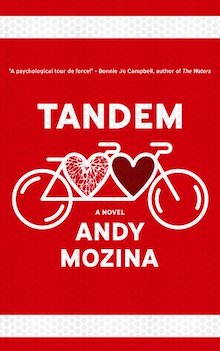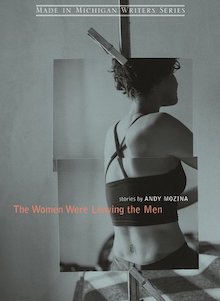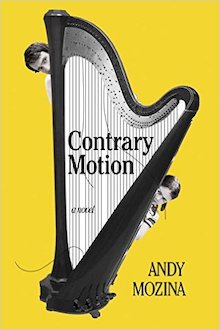Kalamazoo is a town brimming with poetry, and so us fiction writers have to stick together. I’ve known Andy Mozina for twenty years, ever since he came here to teach creative writing at Kalamazoo College, and I’ve been marveling at his work ever since reading his short story “Cowboy Pile,” in which he creates a fictional sociological phenomenon—men out on the prairie lying down on top of one another in a pile to express their grief—and then carrying on with that outrageous premise to the point of absurdity. Yes, in Mozina’s cowboy piles, men on the bottom are crushed to death by the weight of the pile, as they all sing their long lonesome laments—how could they not be crushed by all that weight? Be logical.

Though it starts with a drunk driving hit-and-run, Mozina’s new darkly satirical novel, Tandem (Tortoise Books), is a pleasure to read sentence by compelling sentence. Because each sentence lands with certainty, you don’t notice where you are being led until you are there, implicated along with his characters. Though the novel is grounded in reality, the level to which our protagonist Mike Kovacs must twist and turn to follow his own logic makes for ever more complex practical maneuvering and leads to an outrageous situation. For example, he is compelled to offer the most possible sympathy and love—yes, love—to Claire Boland, the mother of one of the victims of his own crime, which compounds his guilt. The hit-and-run crime is easy to hate, but Professor Mike Kovacs has never killed anyone before, and certainly would never have done it on purpose. As he weighs the pros and cons of coming clean, we grudgingly go along with his logic. Reading the book reminded me about the roads to hell that are paved with good intentions.
+
Bonnie: It’s a pleasure to talk with you about your new novel, Tandem. It’s a brilliant and difficult book, full of tension, rendering your reader desperate to know what these characters will do next. Starting this conversation makes me feel I’m popping open a can of worms, multiple cans of worms. Can you start by telling me a little about how the book came about, how you conceived of it?

Andy: Thanks for the conversation! Okay, I was driving in northern Michigan, listening to an NPR story that involved a drunk-driving hit-and-run. I don’t remember the details of that case, but it seemed the worst imaginable situation for everyone. I thought of how horrible it would be to lose someone that way. A sudden stupid crash—and someone is gone. For the perpetrator, how awful to be responsible for a devastating loss. So there’s awfulness on both sides, but for perfectly inverse reasons. It was such a harrowing feeling, but I couldn’t let go of it. It just about made me want to pull my car over and start walking! Of course, the best way to keep raising tension after such a dramatic opening event was to put the two main characters—Mike, the perpetrator, and Claire, the mother of one of the victims—in contact with each other after the accident, while Mike is trying to decide whether to confess. I wanted to do alternating chapters from Mike’s and Claire’s respective points of view, to keep things balanced, and then I just tried to figure out what would happen next.
Bonnie: Some writers say that the key to writing a page-turning novel is to just keep making things worse and worse for your characters. You certainly do that. After causing the terrible accident, Mike chooses at each turn to not come clean about what he’s done and so ends up deeper and deeper into deceitful behavior as he contorts himself to cover up his crime. I found myself rooting for him, desperately not wanting him to get caught. How did you manage to implicate me, the law-abiding reader, into his crime so nicely?
Andy: To keep a reader involved with a character I think there has to be some basis for sympathy and probably also some basis for judgment or criticism. It’s safer to err on the side of giving your reader a lot of reasons to sympathize with your characters, but I get a little uncomfortable when a story leans too much in a protagonist’s favor—that’s just the kind of perverse bastard I am! I’m drawn to characters about which I hope the reader can’t quite make up their mind. So I’m trying to counter-balance the unsympathetic things you mentioned in different ways, to keep the reader invested. First, a protagonist always gets a little rooting interest, simply by being the character through whom the reader is experiencing the world of the novel; the reader can’t help identifying a little. I finessed the circumstances of the crash, so he doesn’t look too cruel or reckless. I have him go out of his way to treat people well (outside of committing and covering up his crime). He’s self-aware and self-critical to a degree. I make him ridiculous at times, which is sort of a sympathy-inducing bank shot, and, overall, I hope I make him understandable. So hopefully the reader can’t quit him despite what he’s done and is doing. By the way, I tried to do the same thing with Claire, just from the opposite direction.
Bonnie: Yes! That is it! And you do a remarkable job of continuing to make Mike more or less likeable and sympathetic, both by showing the world through his eyes, and by his personality traits which include wanting everything to be supportive and loving for the people around him (carried to the comical extreme). It is partly an exploration of the real fact that good people do bad things. It also confirms that the coverup is often worse than the crime; in this case, the coverup sure is more interesting than the crime. You do take on a lot of ideas and moral issues in the book. Do you see this as a philosophical novel?
Andy: Talking to a philosophy major like yourself, I’m wary of saying something idiotic here, so I’ll answer “yes and no.” I think the novel does end up exploring some moral questions that philosophers might talk about more systematically, so maybe it is a philosophical novel in that limited sense. On the other hand, while I tried to think through those issues to some extent, at least in terms of framing what I hoped would be an interesting problem, I otherwise stuck pretty close just to the decisions the characters were making and why they were making them. Making a coherent philosophy or moral statement out of those decisions and how the novel presents them is above my pay grade! So I wouldn’t say it’s a philosophical novel in that sense.
Bonnie: There is a romantic entanglement in the book which is difficult to characterize. The first thing I might say is that the relationship is fundamentally different for the two people in it—for starters, one person has a piece of information that the other does not. Saying this makes me consider that maybe all romantic relationships are this way, to a greater or lesser degree, maybe everyone hides things, though you have taken the situation to an extreme degree—something that works brilliantly for the story. On the one hand, it seems unconscionable that Mike holds onto his secret, and yet he is right in his conviction that revealing the truth will cause more pain, something he doesn’t want to do. Personally, I assume I always want to know the truth, the whole truth, no matter the consequences, but for Mike revealing the truth seems untenable. What’s up with all that?
Andy: I like the truth as well! This is an example of something I wanted to frame up for the reader—the problem exactly as you’ve described it—then step away, let the characters make their choices, and then let the reader decide what they think about Mike’s dishonesty, what he gets out of it and what it costs him.
Bonnie: I did find the central romantic relationship tough to sit with at times for a number of reasons, not least because of Mike’s own ambivalence about it. You provide a glimpse of another romance that shimmers just out of Mike’s reach, giving us a glimpse of a life in which his past might not haunt him. Can you elucidate anything about that?

Andy: First, I’ll build on something you’ve said: Mike and Claire experience their relationship differently, and their experience of their relationship is also different than the reader’s experience. All those views taken together—the three-eyed visions of reader, Mike, and Claire—contain sweetness, deceit, despair, guilt, affection, discomfort, and love, with three different views on whether the relationship is good or bad for the people involved. And I guess I do invite the reader to sit with that, though that can be uncomfortable. You could say the shimmering relationship is a way to make you even more uncomfortable, because, as you suggest, it helps you fully imagine an alternative to Mike’s current mess. Mike himself actually considers the shimmering relationship itself to be within his reach, though the sense that it could somehow compensate for what has happened is a delusion. Probably most importantly, the shimmering relationship provides another moral test that complicates whether he can redeem himself.
Bonnie: Though the book is two-wheeled, two-person vehicle with Mike’s and Claire’s points of view balancing one another and propelling the story—Tandem is a perfect title, Andy!—I found myself more involved in Mike’s story than in Claire’s. Maybe that’s because Claire’s struggles (her grief about her daughter and her marriage) are simply less dramatic than Mike’s. Was it important to you to give Claire equal time and importance in a book where the more dramatic tension is Mike’s? What special work did you find yourself doing as a writer to get the balance where you wanted it for this narration?
Andy: It was important for me to have the characters more or less equally balanced, because I think of their dramas as being inextricable: what you feel about Mike’s issues depends on what you know about Claire’s and vice versa. You could say Claire’s relationship with Mike is a dramatic part of her grieving process. I also didn’t want to glamorize the bad actor by giving him all the book’s attention and leave the people he’s hurt without a direct voice; working against the trope of the perfect victim, I wanted Claire to hold her own as a flawed person the reader cares about. Then I found as I experimented with different endings, given how intertwined Mike’s and Claire’s business is, there were drama trade-offs between the two characters: choices that made things more dramatic for Mike made things less dramatic for Claire. Whether you’re more invested in Mike or Claire, I tried to choose the ending that would give the book the most impact as a whole.
Bonnie: In a novel about a criminal act, we naturally think about punishment and redemption. I know that you struggled with the ending of this book, meshing the demands of realism with the satirical sensibility. There is a sense in which Mike longs for formal punishment, and he certainly longs for redemption—and he finds the latter in many small ways throughout the story. Without giving away the ending, what were some of the workings in the Mozina-mind as you were finishing the final draft of the story? Were you thinking only of his motivations and character development, or did you take into account the expectations of the readers?
Andy: I did try ending the novel in several different ways. Whether and how and to what degree Mike might be exposed and/or redeemed was definitely a question. I was also thinking of the ending in terms of Claire and her marriage and whether it would survive what was going on between her and Mike. All through the book I was trying to balance motivations and plot developments so the reader couldn’t tell which way things were going to go for both Claire and Mike. The forks in the road really were designed to go either way, so it wasn’t that difficult to try one path and then the other to figure out which seemed to work best. In the end, I chose what I hoped readers would find both most unexpected, most true to the characters, and most interesting to think about.
Bonnie: In some ways your novel is Kafka-esque, but the enemy is not a faceless bureaucracy but rather Mike’s own crime, which is confounding to him and inescapable. Given that America has a national obsession with innocence and has not always welcomed satire and dark comedy, you are challenging us to be open-minded. The mere fact of Mike’s guilt will make some readers unwilling to go down the road with him anywhere other than to the penitentiary. I wonder how you see the elements of comedy and satire functioning in this book?

Andy: I don’t think the novel has a single tone. The trick of writing this story was giving each moment its own integrity in the context of the weight of grief and guilt that are constantly putting pressure on the characters. A lot of humor has its source in pain and pressure or at least the sense that something is wrong. And there’s a lot of wrongness in this book. Not that everything that’s wrong in the book is treated humorously; the tragedies in this book are not funny. But some of the wrongness in response to the tragedies seemed best treated with irony or satire. Humor also has a fascinating doubleness to it—it’s both the pain and the relief. We talk about humor that bites, needles, and even kills (as stand-up comedians say). And it also brings relief, or at least release, through a complicated acknowledgement of what’s going on. So arguably it’s necessary and sensible to have humor at times in a novel with a lot of pain. And I hope the reader feels the doubleness of the humor when it does show up. Without some humor, the underlying darkness of the material might be too much to bear.
Bonnie: Yes, thank you. I see how you are making difficult material bearable in the way a comedian might. There’s something about novels, though—they are long and naturally encourage rumination—that leaves the audience the opportunity to land on a judgmental stance. (I’ve often said that you can get away with more in a short story than a novel because there isn’t that time for rumination.) If you ask me, though, a fall from grace is precisely what fictional characters need to become more human—maybe even real people need such a fall. By the end of this book, Mike Kovacs knows himself in a way he didn’t before. He is a more whole human being after facing his dark side, and maybe he’s a better person. And he does pay for his crime in the book, though his punishment is not the one the law would have inflicted on him.
Andy: Dang, I like how you put that! Yeah, in some ways he is a better person, and in that sense is more fully himself, assuming his self is essentially good or destined to be good. But I’m an old-school existentialist, so I’d also be tempted to say he doesn’t have an essence or a destiny. This is just the way he is now, because of the choices he’s made, for better or worse.
+++
Born and raised in Milwaukee, Andy Mozina majored in economics at Northwestern, then dropped out of Harvard Law School to study literature and write. He’s published fiction in Tin House, Ecotone, McSweeney’s, The Southern Review, and elsewhere. His first story collection, The Women Were Leaving the Men, won the Great Lakes Colleges Association New Writers Award. Quality Snacks, his second collection, was a finalist for the Flannery O’Connor Prize. His first novel, Contrary Motion, was published by Spiegel & Grau/Penguin Random House. His fiction has received special citations in Best American Short Stories, Pushcart Prize, and New Stories from the Midwest. He’s a professor of English at Kalamazoo College. Find him online at andymozina.com
+
Bonnie Jo Campbell is the author of the novels Once Upon a River, a national bestseller, and Q Road. Her short fiction collections include American Salvage, which was a finalist for both the National Book Award and the National Book Critics Circle Award; Women and Other Animals, which won the AWP prize for short fiction; and Mothers, Tell Your Daughters. She is a Guggenheim Fellow, recipient of a Pushcart Prize, the Eudora Welty Prize from Southern Review, and the Mark Twain Award from the Society for the Study of Midwestern Literature. She lives in Kalamazoo with her husband and donkeys.